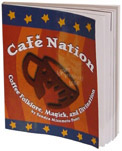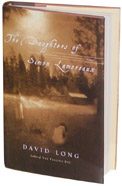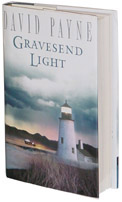|
What is this, some sort of North Carolina thing? A Thomas Wolfe homage, right? North Carolinian author David Payne rains down simile after awkward simile, like the storm that threatens the fishing trip which forms the keel of this seafaring story, similes that cause cringing with each new "as if" and "like," and that finally bring on the weariness of sailors long at sea. Gravesend Light is the story of anthropologist Joe Madden, who returns home to study the natives of the Outer Banks, signing on to a commercial fishing boat to conduct his research. During the funded study, Madden develops a relationship with Day Shaughnessey, a physician at the local clinic. Midway through, Payne's stylistic flourishes die down to an intermittent drizzle, only to give way to implausibility and manipulation. Shaughnessey, a trained physician, just after reliving a Madden family tragedy centered on an unwanted pregnancy, just after going feminist on a girl whose parents keep her from having an abortion, can still muster enough sexual irresponsibility to do without birth control for a night of passion. This one act, as plot would have it, creates an unplanned pregnancy for the good doctor. The book very definitely has its moments. When speaking through his characters, Payne addresses with power and decency subjects that would come off as cliché in other writers' hands. His treatment of backwoods Pentecostalism, homosexuality and abortion render a meaningful picture of great depth and empathy. And in the end, just past these shoals, just as the story seems destined to capsize, Payne's storm subsides completely. Gravesend Light rights itself and putters to shore with a not unsatisfying ending, even if a little contrived, even if a little off trim. -T.R. Wright
 CAFE NATION CAFE NATION Sandra Mizumoto Posey Santa Monica Press
Cafe Nation is very much an indulgent Mocha Latte; over-indulgent, a bit too sweet, but definitely coffee. On one hand, Ms. Posey cares a great, great deal about coffee, and has done a great deal of research; on the other hand, she also puts a great deal of stock in the new age, mystical, and magical properties of coffee, thus most of the book reads like a Dungeons & Dragons rulebook, Starbucks edition. Most of Cafe Nation deals with coffee rituals, preparing for 'magick,' coffee potions and spells, and lessons on coffee divinations and it's very, very goofy. Read the word magic with a k more than twice and just try not to hate. The first chapter describes the history and folklore of coffee and that's pretty interesting, but it serves only to illustrate that the human race should really have outgrown all the other nonsense by now. Also useful are various recipes (not the potions) scattered throughout the book, but hardly worth searching for in all the magick. To Posey's credit, she does not rest on the old form of coffee divination, but has devised her own "Cafe Nation" process. If you have over five candles burning at this very moment, more than one power crystal, and still love a cuppa joe, then Cafe Nation may be for you. For those whose need for coffee requires daily baths in the stuff as well IVs directly into the heart sac, Cafe Nation may be too magickal a mockery of the beloved beverage. -RB
 THE DAUGHTERS OF SIMON LAMOREAUX THE DAUGHTERS OF SIMON LAMOREAUXDavid Long Scribner
Just in time for Christmas, a gift suitable for a President. He liked Vox so much, he should like The Daughters of Simon Lamoreaux. Rendered exclusively by phone and email, the story of Carly Lamoreaux's disappearance in 1973 is recounted 20+ years later by her sister, Julia. She's speaking and writing to Miles Fanning, Carly's boyfriend at the time of her disappearance. Fanning moved on with his life, while Julia and her father, the dour Quakeresque Simon, didn't. The Daughters of Simon Lamoreaux is more like a Vox meets Lord Jim, with Julia filling the role of Conrad's loquacious narrator, Marlow. Author David Long fills page upon page with uninterrupted phone-borne soliloquies, following them up with massive system-crashing emails, churning out a backstory that fills half the novel's length. The saving grace of Long's method is that this twenty-year-old story is a good one, much better than the more recent third-person narrative in which it's nested (which, not to give away the ending, doesn't have one, and the love story that develops lacks anything resembling chemistry). The reader sees, in spite of Julia's jaundiced eye, how poignantly human her father really is as he searches for meaning in his unspeakable, lingering loss. Long's novel isn't vacuous like Vox. It's a richly rendered contemplation of one man's struggle with tribulation. But the President has experienced personal growth as a result of his own trials - at least that's what he said at the prayer breakfast - making The Daughter's of Simon Lamoreaux the perfect Presidential stocking stuffer. -T. R. Wright
|
||
|
|
 GRAVESEND LIGHT
GRAVESEND LIGHT